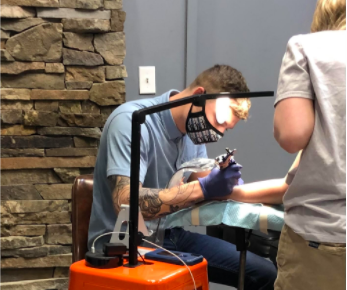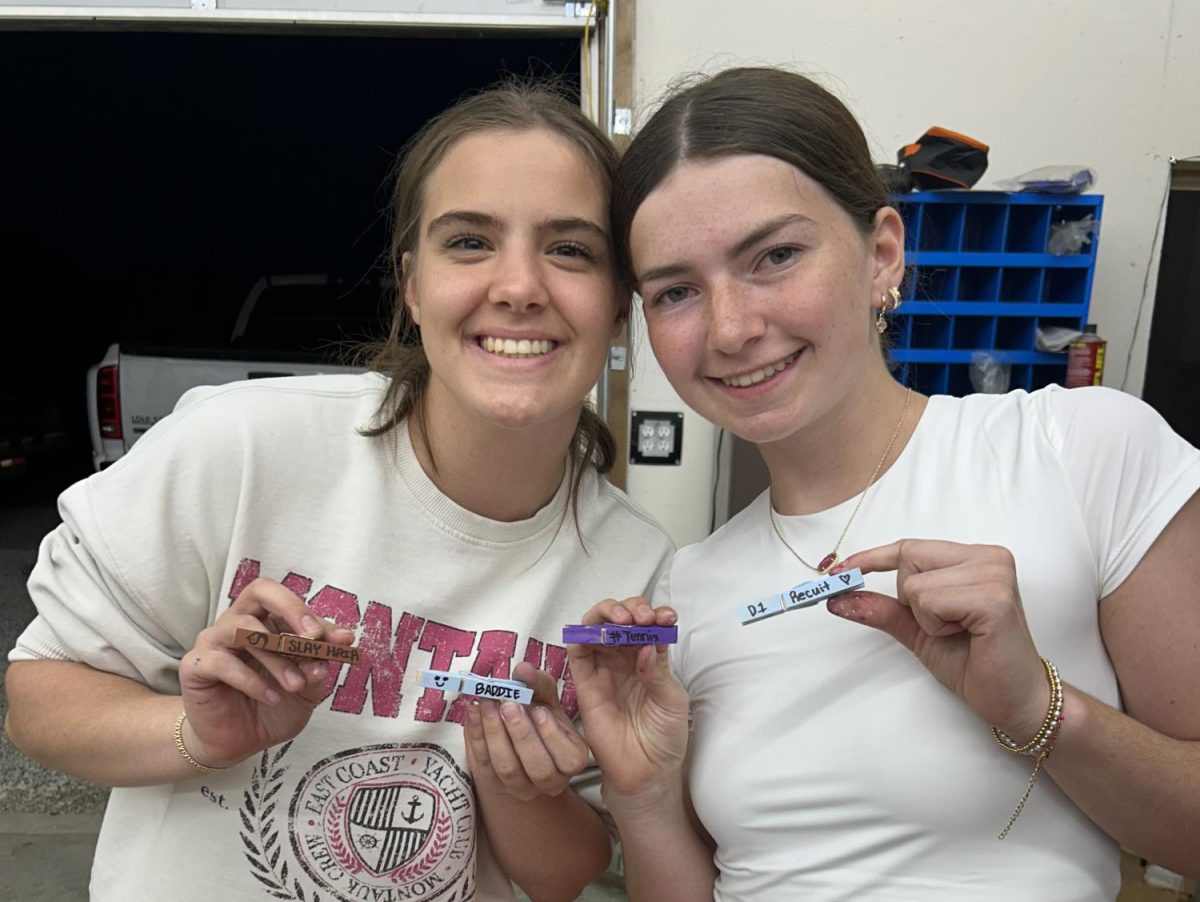Tattoo or Not Tattoo: That is the Question
Should high school students be able to get tattoos?

Former AHS student Harison Richter, who graduated in 2015, now tattoos professionally. He began working the front counter at Big Brain West in September of 2020 and has been an apprentice since November of 2020. Only in “the last month or so” has he been tattooing people.
May 17, 2021
When it comes to expression, high schoolers find many ways to show their personalities through style. While some articles of clothing can be prohibited by the dress code at school or get damaged from the wear and tear of everyday life, one form of expression can not easily be undone: tattoos. Although these works of art can not be lost or damaged, their permanence can lead to regret and shame resulting from a spur-of-the-moment decision.
According to Adolescent Tattoos, Body Piercings and Body Modifications, “Studies have shown that an estimated 10-23 percent of adolescents have tattoos,” and “Among high school students who don’t already have a tattoo, more than 50 percent said they are interested in getting one.” Some tattoos can have detrimental health effects and be regarded with regret, but for others, tattoos can connect people to loved ones and help them express themselves.
Former AHS student Harison Richter, who graduated in 2015, tattoos at Big Brain West in Omaha. Richter got his first tattoo on his eighteenth birthday, and he now has quite a few. “I don’t think a lot of people, especially teenagers, are patient enough to really consider the design or placement of a tattoo before they get it,” he said. “Then later they have to get the tattoo covered or removed. I feel a lot of what’s popular in the tattoo mainstream now won’t be popular in a couple years and people should really do their best to imagine what tattoos they are going to enjoy looking at when they are 60 years old.” Although he thinks teenagers should be careful what tattoos they get, he also said “I won’t say that I think it’s a bad idea for a teenager to get a tattoo…. If you do your research and find an artist you really like and you wait for the opportunity to get in with that artist, you are probably going to get a great tattoo you are going to love the rest of your life. But if you get on Pinterest and find the first thing that catches your eye and find the first person available to do your tattoo, you are probably going to get something you regret.”
At AHS, many students and staff use their tattoos to express themselves. Junior Jaci Smith currently has seven tattoos and plans to get more in the future. On the right side of her body, Smith’s tattoos all have meaning, such as her parents’ handwriting and her grandparents’ birthdays in roman numerals. On her left side, Smith plans to do what she calls “sticker tattooing.” She said, “Basically if you just have a little memory, say like New Years’ or something, and there was like a little inside joke you wanted to get tattooed, you could always have that little memory to look back at. Even if the memory turns out [to be] something bad, it can be positive for you to look back at it.” She went on to say “I really like tattoos, because I’m somebody who can’t really remember things, and I like keeping my memories… so I feel as if younger people should get tattoos, mainly because you only live once, and why not?”
Similarly, ISS supervisor Mallory Kirchoff has eight tattoos, each of which has a deeper meaning or serves a purpose to her. When it comes to teenagers getting tattooed, Kirchoff said “I think teenagers can make decent decisions, especially with informed consent from parents. I wouldn’t say it’s a bad thing, I would just suggest not getting something that you can regret in the future, whether that’s someone’s name or something that’s trendy. Like, don’t go get something that’s super trendy and then in two or three years, it’s going to not be a trend anymore. Do something that is more meaningful to you or your family.”

While some at AHS are in favor of teenagers getting tattoos, others are not so sure. “I honestly don’t care if people get tattoos or not,” said sophomore Katie Birge. “But for teenagers, I don’t think they should get tattoos until they’re old enough to make a commitment to a permanent piece of artwork on their bodies…. tattoos are something hard to remove and to make a decision like that at such a young age seems like a risky move.” Similarly, Senior Lex Somers said “getting a tattoo representing something important in your life actually degrades the importance of that something. Having a constant reminder of something important takes the importance of that something away. It just becomes a slight buzz in the background of your mind that you will eventually forget. As an analogy, I’ll use a birthday. Birthdays are special because they are only celebrated once a year. If you celebrated it every day, then no one would care. It’d just become another piece of useless information in everybody’s already cluttered lives.”
In addition to teens potentially regretting their tattoos because they were not thoroughly thought-through, tattoos can also cause medical difficulties. According to Adolescent Tattoos, Body Piercings and Body Modifications “Tattooing can be associated with transmission of some bacterial infections and viral infections including Hepatitis B, C, and HIV…. There also have been some case reports of certain types of skin cancers.” Tattoo removal can also cause medical issues, including “skin color changes, scarring or limited effectiveness.” Kirchoff experienced difficulties with her first tattoo, which was stars and hearts on her left foot. In her words, “part of that was just a locational issue. When you get your feet tattooed, shoes are very difficult to wear, and the pair that I wore actually wore a hole into the tattoo. I was very fortunate that it didn’t affect the color or scar the tattoo.”
In the end, it’s up to individual teenagers and their parents whether or not they get tattoos, and what those tattoos are of. Although tattoos can lead to regret, missed job opportunities, and infection, they can also connect students to their loved ones, help them express themselves, and memorialize things that are important to them.









